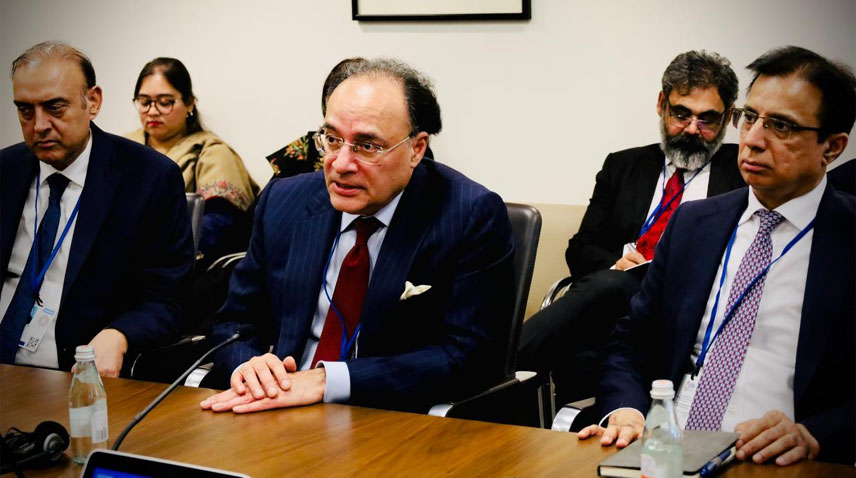WASHINGTON: Finance Minister Muhammad Aurangzeb outlined a sweeping reform agenda during a conversation at the Atlantic Council, as the country receives high praise from the International Monetary Fund (IMF) for stabilizing its economy but continues to confront severe climate-related challenges.
In a session moderated by Dr. Aasim M. Husain, former Deputy Director of the IMF’s Middle East and Central Asia Department, Aurangzeb spoke candidly about Pakistan’s efforts to maintain macroeconomic stability, reform its tax system, empower the private sector, and prepare for increasingly frequent natural disasters.
Opening the conversation, Dr. Husain congratulated the minister for securing a staff-level agreement with the IMF, marking the successful completion of the first year of Pakistan’s IMF-supported program. The IMF cited progress in macroeconomic stabilization, a narrowing of sovereign spreads, and the first current account surplus in 14 years.
Speaking on the occasion, Aurangzeb noted that “we have consolidated our gains,” highlighting endorsements from all three major credit rating agencies—Fitch, S&P, and Moody’s—as further validation of Pakistan’s direction.
Addressing the country’s recent devastating floods, Aurangzeb emphasized that the government chose not to appeal immediately for international aid, unlike in 2022. “We’re in a relatively comfortable macroeconomic position,” he said. “So we are repurposing existing fiscal space for rescue and relief efforts.” He acknowledged that agricultural losses—particularly in cotton and rice—would reduce GDP growth expectations from over 4% to “still north of 3%.” The government, he said, is working under a 300-day action plan to prepare for the 2026 monsoon season, which may arrive earlier than usual.
On domestic revenue mobilization, Aurangzeb discussed Pakistan’s push to broaden its tax base. The country raised its tax-to-GDP ratio from 8.8% to 10.2% last year and aims to reach 11% by the end of the current fiscal year, with a medium-term goal of 13%. “This is not a matter of choice anymore,” Aurangzeb said, citing new efforts to tax traditionally untaxed sectors such as agriculture, retail, and real estate.
He credited recent technological advances in tax collection, including AI-based analytics and digital monitoring, for early gains in sectors like sugar, cement, and tobacco. He also acknowledged ongoing public skepticism but insisted that “we had to start from somewhere.”
In response to questions about fiscal federalism, Aurangzeb acknowledged concerns about the current National Finance Commission (NFC) arrangement, under which nearly 60% of federal revenue is distributed to provinces. He revealed that the inaugural meeting of the new NFC has been delayed due to floods but is expected in early November. “It’s consensus-driven,” he said, “and we’ll have to come together as a country to think through these issues.”
Aurangzeb underscored the government’s pivot to private sector-led, export-driven growth, moving away from unsustainable public spending cycles. A key component of this strategy is a new National Tariff Policy, which aims to phase out excessive duties on raw and intermediate goods to support industrial competitiveness.
Despite internal resistance, the government has embraced what Aurangzeb called an “East Asia moment”—favoring long-term reform over short-term fiscal gains. “Finance agreed to this shift because it’s the right thing for the country,” he said. He added that new export corridors with GCC countries and Central Asia are being developed, alongside growing investments in IT services and projects like Reko Diq, which is expected to add $2.8 billion in annual exports—nearly 10% of current levels.


Comments are closed.